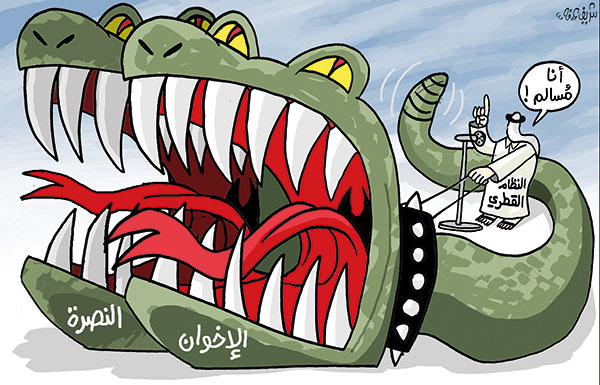The relation between Muslim Brotherhood and Qatar has many faces and objectives, as they used their alliance many times to harm the interests of Qatar’s neighboring states to achieve their interests at the expense of the regional stability in the Middle East
The brotherhood exerted its efforts to strip legitimacy of Saudi Arabia’s regime by prompting a broad state of discontent using hired dissidents (more recently, exiled militants) and thousands of hired tweeters who in the event of an ordinary general protest, prompt a hashtag in the hope of turning the protest into disobedience and even rebellion.
They have supported extremist currents and groups inside the country, working against any step toward modernization or pursuing an enlightening project. The propaganda has created a state of internal crisis on issues that have been dormant for years and promoted a lie of conflicting currents.
At the same time, it has conveyed a negative image of Saudi Arabia in Western media (some of which are Qatari-owned).
This is why it is not surprise to see this scenario repeated time and time again: A Muslim Brotherhood extremist in Riyadh, strongly criticizing Saudi Arabia, inciting them if they take the necessary steps toward reforming women’s rights and social freedoms.
Simultaneously, you find a Brotherhood member speaking to the media in London or Washington, launching a campaign against the kingdom for representing a dark and violent version of Islam. Followed by this, it promotes the alternative, a moderate Muslim Brotherhood Islam.
This is similar to Iran’s strategy and the only difference is that Tehran promotes Shiite political Islam as a soft and modern alternative. Doha and Tehran promote propaganda while linking terrorist organizations to Saudi Arabia, despite it being the biggest target. This happens despite both countries sponsoring some of the concerned organizations with training, money and weapons.
This game plays out across different languages, which results in two contradicting speeches at the same time – both attempting to achieve one goal. This is neither new for Doha nor for Muslim Brotherhood. The Brotherhood has been well known for conspiracy, intrigues and contradictions.
Shaking hands with Perez as well as with Qaradawi at the same time is an example. Another is Abdullah al-Muhaisni embracing a leader in al-Nursa group while attracting academics from prestigious universities such as Georgetown!
The boycott has unraveled this two-faced game more and more and that is one of its benefits. Doha has also removed its mask recently, opening about this game through its official forums years after apparent camouflage.
Hundreds of thousands of Twitter users have been recruited to attack Saudi Arabia, the UAE, Bahrain and Egypt. They operate in secret and have now uncovered their identities during the last 100 days.
Saudi Arabia’s national day was just a new occasion to unravel this old, regenerative role. While the Saudi’s celebrated their national day with unprecedented ceremonies, the Qatari-Muslim Brotherhood propaganda spread through its channels, websites and through Twitter. There were false news and comments describing these celebrations as disintegrations as stepping out of line.
Why do it? The answer yet again reveals these two-faced misleading roles. Because they wanted to play the role of an extremist militarist promoting that such celebrations, practiced by people around the world, are a deviation from religion.
For years, this has been the exact role played by extremists and members of the Qatari-Muslim Brotherhood circle before the boycott. These people have launched outrageous inciting attacks against a simple concert, while they turn a blind eye to all the festivals and celebrations held in Doha.
Simultaneously, when a concert or theatre performance is stopped because of their pressure, the expatriate brotherhood comes into play describing Riyadh as an oppressor of art, creativity and being opposed to enlightenment. On the other hand, Qatar is praised for its museums, embracing of art and availability of foreign institutions and universities.
In a rather all-cards-on-the-table game, these instigators direct a hateful and treasonous campaign against the Saudis, who are demanding to fight these stone-age ideologies. Their goal is to intimidate those who criticize them in order to strengthen their position, extend their influence, and in turn being able to achieve their biggest plan, which is to tarnish Saudi Arabia’s image in the world. All this is, of course, is surrounded by negative foreign propaganda that is constantly being promoted; a Saudi Arabia who opposes progress and questions art and creativity.
Recently, someone published a Brotherhood-type rumor, claiming that Saudi Arabia is entering a police stage and searching consciences. He referred to what the Saudi diaspora called, triggering the American imagination, which is emotionally moved by such terms with a heavy historical connotation. So if you seek change and improvement, you are accused of westernization, and if you don’t seek change, they accuse you of regressive thinking.
The Qatari-Muslim Brotherhood propaganda has no principles. It is a machine created to spread chaos and support extremists everywhere, (last of whom is Indian extremist Sulaiman al-Nadawi, who condemned Gulf states’ governments, accepted Baghdadi as leader and was hosted by Qardawi in Doha).
It uses these multiple faces and shifting roles, which are charged with the worst intentions seeking to spread hatred and support terrorist organizations. So, no matter how negatively you think of it, you should always think much worse of it and expect the worst.








































admin in: How the Muslim Brotherhood betrayed Saudi Arabia?
Great article with insight ...
https://www.viagrapascherfr.com/achat-sildenafil-pfizer-tarif/ in: Cross-region cooperation between anti-terrorism agencies needed
Hello there, just became aware of your blog through Google, and found ...